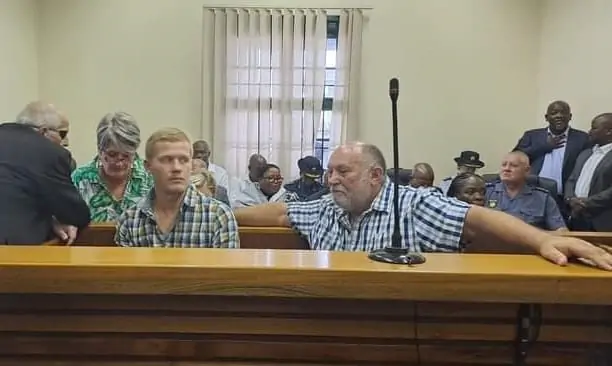
The Groblersdal Magistrate’s Court once again became the center stage for the bail application of Pieter Groenewald and his son Stephan, accused of assaulting and setting dogs on an employee. This high-profile case has reignited discussions about justice, race relations, and the complexities within South Africa’s legal framework. As the proceedings resumed, tensions escalated both inside and outside the courtroom, with passionate protests and clashes highlighting the deep-seated issues at hand.
Pieter Groenewald, a figure with a controversial past, stands accused alongside his son Stephan in a case that has captured the attention of the nation. Groenewald senior’s history includes two previous convictions, one for murder and another for attempted murder, dating back to 1990. Despite this, he maintains his stance as not being a flight risk, adding a layer of complexity to the ongoing legal battle.
Outside the confines of the courtroom, crowds gather, voicing their opinions and concerns. The presence of protesters underscores the underlying racial tensions within the town, reflecting broader societal divides that persist in post-apartheid South Africa. The case of Groenewald and his son has become a focal point for these tensions, drawing attention to issues of privilege, justice, and accountability.
During the last court appearance, the fervor surrounding the case reached a boiling point. A group of protesters, demanding the release of the accused, clashed with law enforcement officers, further highlighting the charged atmosphere surrounding the proceedings. The incident serves as a stark reminder of the challenges faced by the South African judicial system in addressing issues of inequality and social justice.
Amidst the chaos and controversy, questions arise about the efficacy of bail procedures and the broader implications for societal cohesion. The bail application process, intended to ensure fair treatment and prevent flight risks, becomes a battleground for competing interests and ideologies. As the court grapples with legal technicalities, the underlying tensions continue to simmer, threatening to boil over at any moment.
For many South Africans, the Groenewald case symbolizes larger systemic issues within the justice system. The legacy of apartheid, coupled with ongoing economic disparities, exacerbates feelings of injustice and marginalization. The protests outside the courthouse serve as a powerful expression of frustration and discontent, highlighting the urgent need for meaningful reform.
In the quest for justice, voices from all sides clamor to be heard. Advocates for the accused argue for fair treatment and due process, emphasizing the presumption of innocence. Meanwhile, activists and community leaders rally against what they perceive as systemic biases and failures in the legal system. The clash of perspectives underscores the complexities inherent in navigating South Africa’s tumultuous path towards reconciliation and equality.
As the bail application for Pieter Groenewald and his son Stephan unfolds, the eyes of the nation remain fixed on the Groblersdal Magistrate’s Court. Beyond the confines of this courtroom drama lies a deeper narrative—one that speaks to the ongoing struggle for justice, equality, and unity in a nation grappling with its past and striving towards a better future.
In conclusion, the bail application for Pieter Groenewald and his son Stephan serves as a microcosm of the broader challenges facing South Africa today. As the legal proceedings continue, it is imperative that we confront these issues head-on, fostering dialogue, understanding, and meaningful change. Only then can we truly aspire towards a more just and equitable society for all South Africans.
By addressing the complexities of this case and its implications for broader societal issues, we can begin to unravel the intricate layers of injustice and work towards a future where the principles of equality and fairness prevail.
This website uses cookies.